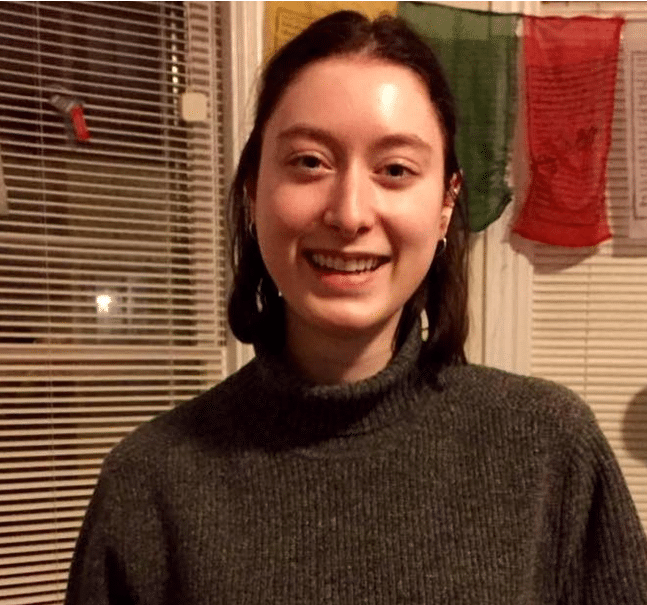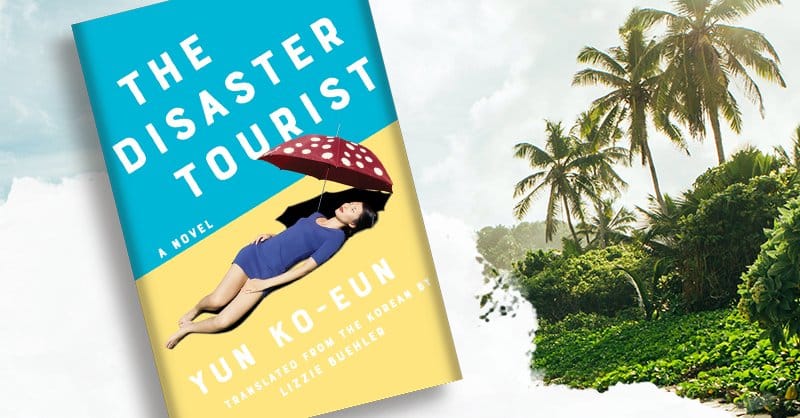ANDREA PLATE WRITES — Lizzie Buehler, 25, raised in Texas, is the translator of The Disaster Tourist, South Korean author Yun Ko-eun’s first novel to be translated into English and published in the US recently.
This truly original book is about international tourists who thrive on visiting world-famous tragic sites (in this case, of fictional desert island off the shore of Vietnam, which proudly showcases a historic sinkhole). But it almost never got to America. “I am grateful to Lizzie Buehler,” the author has said. “If she [Lizzie] hadn’t, by chance, picked up and translated this book, it might not have left Korea.”
Buehler is currently at Harvard University, working toward a PhD, having already completed an undergraduate degree in comparative literature at Princeton University and an MFA in Literary Translation from the University of Iowa. A lively and personable wunderkind who lived for one high school year in Korea, Buehler was interviewed by Andrea Plate, Asia Media International’s Senior Editor, about the impressive wave of young female South Korean authors whose works are reaching the US this year amidst the rise of the feminist movement there.

Q: Is The Disaster Tourist a feminist novel?
A: The Disaster Tourist was published in 2013 in Korea, before the #MeToo movement. So, this novel wasn’t written as a reflection of that. Yun Ko-eun had actually thought more about power imbalances in general terms, like social hierarchy and Confucian history. She thinks the biggest issue is the abuse of power, which is the case in a lot of Asian countries, but I think South Korea is one of the countries where this is most stringently observed. Obviously, there is also a movement toward gender equality now.
Q: Is translation women’s work?
A: Before 2000, almost 100% of South Korean authors were male, but I feel like almost every writer who has been translated into English these days is a woman. Also, many of the translators are women. It definitely skews female.
Q: Why?
A: People tend to talk about translation as a gendered activity that’s derivative and lesser than writing. But maybe also it’s because women are more likely to major in foreign languages in college.
Q: How did you, so young, get the opportunity to translate The Disaster Tourist?
A: So much of translating is definitely luck. When somebody who’s already well-known gets published, like [Japanese superstar author Haruki] Murakami, the publisher looks for a translator. Most translators that I know have a very different experience; we find the writer that we love who writes in a language other than English and then we have to act as agents on our own to bring it to the English- speaking world.
Q: It seems that South Korean translators and authors develop close, almost symbiotic bonds.
A: I’m 25. Yun Ko-eun is 40. Last summer we were able to meet in person after four years online and now we stay in touch quite regularly…. Of course, if the writer is not alive then you’re on your own!
Q: The heroine of this novel more or less shrugs off her boss’s sexual harassment. That’s not something a good, wholesome feminist would do, right?
A: This part of the story was based not just on [the author’s] female friends but also male friends who were taken advantage of by their bosses and made to work too much. What I like is that Yuna [the main character in The Disaster Tourist] is in some ways ethically ambiguous.
Q: Korean author Bae Suah (‘Untold Night and Day’ and many others) says she loves having strong female characters at the center of her novels. That seems to be the trend, right?
A: Men as well.
Q: How has Korean to English translation changed as South Korean society changes?
A: A lot more literature in translation is being published now, so there is more diversity of voices. When Korean literature first started becoming mainstream in English, maybe five years ago, a lot of books being published were highly literary and serious, but I like humorous or sarcastic ways of looking at contemporary society. And in the past few years there’s been this movement from literal translations published by very literary independent presses to more and more mainstream entertainment, and I think that’s nice. It’s gone from very erudite books with small markets to books you could find in an airport.
Q: Any prediction about future literary trends?
A: I’ve noticed a trend toward science fiction, and crime thrillers are happening now.
Q: How did a young American girl like you get hooked on South Korea?
A: A lot of young people in the US are attracted to Korea because of K-pop, or Korean dramas and celebrities. That was not the case for me. I didn’t know that much about Korea, to be honest, but I’ve had this fascination with North Korea and Communist countries, since I was very young … the untouchable nature of a closed-off country was appealing to me. I spent a year of high school in Korea in 2012. I thought spending time in South Korea would provide access [to the North] but I ended up liking South Korea on its own.
Q: No Korean family ties?
A: My grandfather worked for a tile manufacturing country that had factories in South Korea, but my grandparents aren’t aware of all the changes since the seventies. They told me about pots of kimchi that people put under the ground to ferment. And I’m like, well, most people in Korea live in apartments and don’t have yards and shop in grocery stores.
Q: You spent a high school year in South Korea. What was that like?
A: I got a really good introduction to life, not only in Seoul, which is sort of all that people focus on if they’re outside Korea, but also on the more rural parts of Korea that are often overlooked.
Q: You’ve said that literary translation is not just about words, but about the person and what’s in their heart. What appealed to you about Yun ko Eun’s heart?
A: Whimsy and humor.
Q: The US edition of the book includes a section entitled “About the Authors,” plural. I guess it’s obvious that translators now can be considered on a par with authors.
A: Oh wow, I didn’t know that. Awesome!!
Andrea Plate, Asia Media International’s senior editor for writing and editing, holds degrees in English Literature (UC Berkeley), Communications-Journalism (USC) and Social Welfare/Public Policy (UCLA). Her college teaching experience includes Fordham University and Loyola Marymount University. Her recent book, MADNESS: In the Trenches of America’s Troubled Department of Veterans Affairs, about her years as a staff social worker at the U.S. Veterans Administration, was published in Asia and North America by Marshall Cavendish Asia International.

